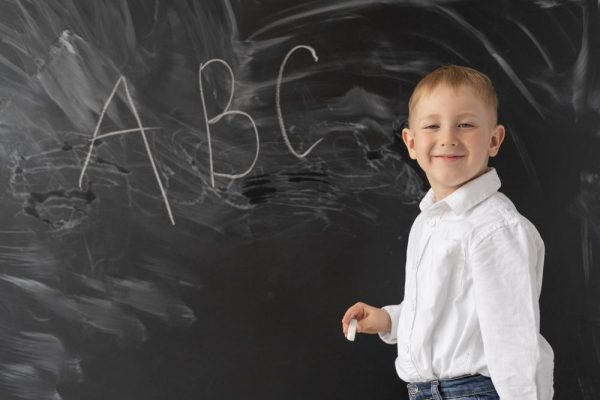

Handwriting is an essential life skill. When handwriting is automatic, children can more easily express their thoughts and ideas, participate in school-related tasks, and develop reading and spelling skills. Later in life, handwriting skills allow us to do many tasks including filling out paperwork, signing documents, writing in birthday cards, and taking notes of important dates or information. But handwriting is a complex activity involving lots of underlying skills. At Mobile Therapy Centers, Occupational Therapists can help assess the underlying skills needed to develop and improve children’s handwriting.
Skills Needed for Handwriting Development
Handwriting Development requires a lot of underlying skills. Here are some of the skills that Occupational Therapists at Mobile Therapy Centers look at when assessing a child’s handwriting skills.
- Pre-writing skills – lines and strokes needed for future letter formation
- Hand/Pencil Grasp – pencil grasp starts developing in infancy through grasping toys
- Postural Control – core strength and postural control are required to sit upright allowing our arms to move freely for writing tasks
- Fine Motor Control – in-hand manipulation skills to pick up a pencil and move it into the correct position
- Bilateral Coordination – the ability to coordinate both sides of the body together
- Visual Motor Integration – the eyes and motor movements work together in an efficient way
- Motor Planning – the ability to plan, organize, and carry out a movement
- Proprioception – sensory awareness in the fingertips
Developmental Milestones for Handwriting
Developmental milestones provide age ranges for when we can typically expect children to begin to show certain skills. At Mobile Therapy Centers, Occupational Therapists can help kids progress through milestones to develop age-appropriate skills. As with all developmental milestones, keep in mind that there is a wide range of “average” and children’s acquisition of these milestones can be influenced by their level of interest and attention. When in doubt, a consult with an Occupational Therapist can help assess developmental skills.

1-2 years
- Scribbling
- Imitating vertical lines, horizontal lines, circular scribbles
- Clapping hands together
- Putting small objects into containers
- Beginning to hold a crayon with fingertips and thumb
2-3 years
- Imitating circle
- Copying vertical line, horizontal line
- Beginning to hold a writing utensil with fingertips and thumb facing the tip
- Imitates bilateral movements of arms and legs
3-4 years
- Drawing circle without a model
- Imitating cross
- Beginning to develop a tripod grasp
- Unbuttoning large buttons
- Cutting paper in half
- Can touch each finger to their thumb individually
4-5 years
- Imitating square
- Copying cross, square, and beginning to copy right and left diagonal line
- May be able to write own name
- Drawing a recognizable face with eyes, nose and mouth
- Drawing a basic stick figure with 2-4 body parts
- Coloring inside a circle and filling it at least halfway
5-6 years
- Copying triangle, X shape, right and left diagonal lines
- Printing own name
- Copying most capital and lowercase letters
- Drawing a person with at least 6 body parts
- Maturing hand dominance
Potential Handwriting Concerns
Learning to write involves a combination of skills and abilities and an understanding of language. If your child is having difficulty with one or more of these skills, they might have some trouble with learning handwriting.
Here are early signs that your child is having difficulty developing the skills to write by hand at school:
- Swapping hands while drawing or handwriting during the first year of school – most children prefer using one hand for drawing before they reach school, but some children have already started school when this happens.
- Writing slowly or struggling to draw letters correctly – your child might need some help developing motor skills to make smooth, careful movements.
- Gripping a pencil differently from the way they were taught or gripping the pencil weakly – this can slow down your child’s handwriting and make it hard for them to complete work in a reasonable time.
- Lacking interest in or avoiding drawing and handwriting – this might happen if your child isn’t confident about drawing.
- Writing in an untidy way might look like reversed letters, letters not correctly closed, inconsistent letter size, letters that don’t sit on the line and inconsistent spacing between letters and words.
- Appearing tired when writing or drawing may mean that your child does not have the fine motor strength or postural control to engage in writing or drawing activities for as long as developmentally expected.
If your child is struggling with handwriting and/or any developmental skills, contact MTC to speak with one of our Occupational Therapists for a FREE screening/consultation. Mobile Therapy Centers is a Multidisciplinary Clinic and services include ABA Therapy for Autism, Speech Therapy, Occupational Therapy, Behavioral Therapy, Feeding Therapy, and Counseling. MTC has clinics in Illinois and Tennessee.
Reach out to us today at 800-977-9072, email asktheteam@mtcus.com or visit www.mtcus.com for more info.